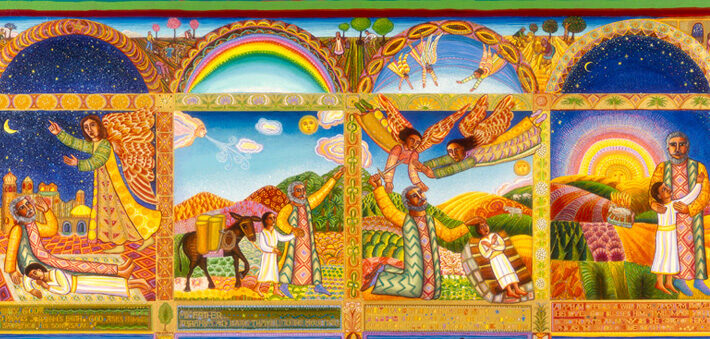Commentary on Romans 6:12-23
This reading is a continuation of Romans 6:1-11, where we discussed theological themes of sin and death in relation to Paul’s teachings on the sacrament of baptism and eschatology.
Verses 12-23 orient readers toward living a new life because justification is probably the beginning of what we may call Christian life, which is followed by sanctification. However we understand justification, one thing that stands clear is that Paul understands a new walk with Christ as the work of grace in which resurrection power propels believers to live worthy lives.
It may be appropriate at this point to bring in a dialogue between conservative and liberal Christianity. The former is a form of Christianity that is strict in terms of making believers live by the biblical principles, even if it means messing with their human rights that are in most cases dictated by the desires of the flesh. The latter is a form of Christianity whereby flexibility is allowed and growth is given chance because humanity is always under the pressure of the flesh and the spirit is always in conflict with the human body (see Galatians 5: 16-26).
Theoretically, the apostle Paul makes readers ponder on the differences between religion and spirituality, and this may be taken by some as a conversation around ethics or religion and ethics of spirituality, of which the human being is always caught in between. Theologically, Paul teaches that believers must at some point grow from being religious to becoming spiritual for that is the work of grace and sanctification.
The solution is resolved when Paul motivates believers to grow within the fruits of baptism and to “become what you now can become,” which means that one has to grow and mature spiritually. Spiritual maturity is indeed a struggle for many believers, and preachers need to educate people on ways they can grow spiritually.
Like the apostle Paul, preachers must exhort believers to live out their faith in concrete ways, and this can be done when people aspire to live in love because love is the vitality of faith and love accomplishes Christ’s saving work. Love is indeed the description of the Christian life, and while we cannot fully grasp the meaning of being in mystical union with Christ, Paul exhorts us to live out this mystery in love. Becoming what we have become in baptism means to live beyond religiosity.
Three Pauline teachings are clear in this passage. First, Paul is not concerned with issues of sin and guilt, but he is advocating for freedom from the power of sin, that is, believers can make a conscious effort on whether they should sin or not. Secondly, Paul is not concerned with growth to perfection but with an awareness of the once and for all saving act of justification done by God through Jesus Christ. The Christ event launched humanity into the ocean of grace and no one will ever take that away from believers. Third, the gift of grace and salvation calls believers to live in obedience as a verification of the work done by Jesus Christ.
While it is hard in North America to discuss issues of faith, spirituality, and Jesus Christ, in the Global South, believers are intrigued and invigorated by knowing that “In Christ, In the Spirit, and With Christ,” are part of what it means to live the eschatological act of salvation. These theological truths are what grounds Christianity in Third World nations, and they were grounds of Christian boasting even in the ancient Christian faith communities. Without these three, it becomes difficult for preachers to teach about the complementarity between faith and baptism. Everything boils down to the fact that the lordship of Jesus Christ summons believers to live ethical, Christ oriented lives.
In this chapter, the premises are given in verses 1-11 and 12-123 in the sense that freedom from the power of sin is grounded in the sacrament of baptism and salvation of which the effects are manifested in service to others and to the world. Resisting sin and victory over it depends on our realization that Jesus Christ is Lord of all and Christ imparts grace to us during and after baptism. Becoming what you have become in baptism signals new growth and one has to experience the results in real life of faith.
Metaphorically, Paul speaks the language of members, meaning parts of our bodies that do not function in autonomous ways but always subjected to the lordship of Jesus Christ. Christian existence and all our bodies belong then to the realm of the power of resurrection and our existence is not exempted from challenges, sicknesses, and powers of this world. The mortal body is still the bull’s eye for the devil, but because of resurrection believing humanity is always under the protection of the risen Lord.
As believers then, we are called to be slaves to righteousness, meaning that we only have one master and by conversion that master is God. Maybe, African-Americans and colonized nations have hard time with the language of slavery because our consciousness is marked with years of enslavement and dehumanization. In any case, verse 17 points believers to a shifting paradigm, that is our allegiance as former slaves is no longer to masters but to a God who loves us unconditionally.
The change is irreversible, and the freedom launches us into the righteousness of God. Righteousness leads to increased spirituality and holiness both of heart and with each other. Freedom for obedience then means that our faith is secure and that we continue to go through a journey of sanctification in which believers are gradually transformed into the likeness of Jesus Christ.
The results of living a righteous life are that we begin to experience eternal life even while we are still on earth. Many Christians still ask weather one can live a holy life and whether people can experience eternal life whilst on earth. I leave that to others to decide, but from Paul’s theology, believers are privileged to experience the glimpses of eternal life (2 Corinthians 5:3). As believers, we probably think of these results as wages given to workers in whatever field they labor.
In Romans 6:23, Paul reminds us that the “gift of God is eternal life in Christ Jesus our Lord.” That is when we labor for God with faith, what we get is indeed more than wages for we cannot measure it with earthly standards but it is far more beyond us. It can only be called the gift of grace — that we are given what we do not deserve and that gift is eternal life. Christians must ask themselves who they serve and whose they are in all what they do.


June 29, 2014